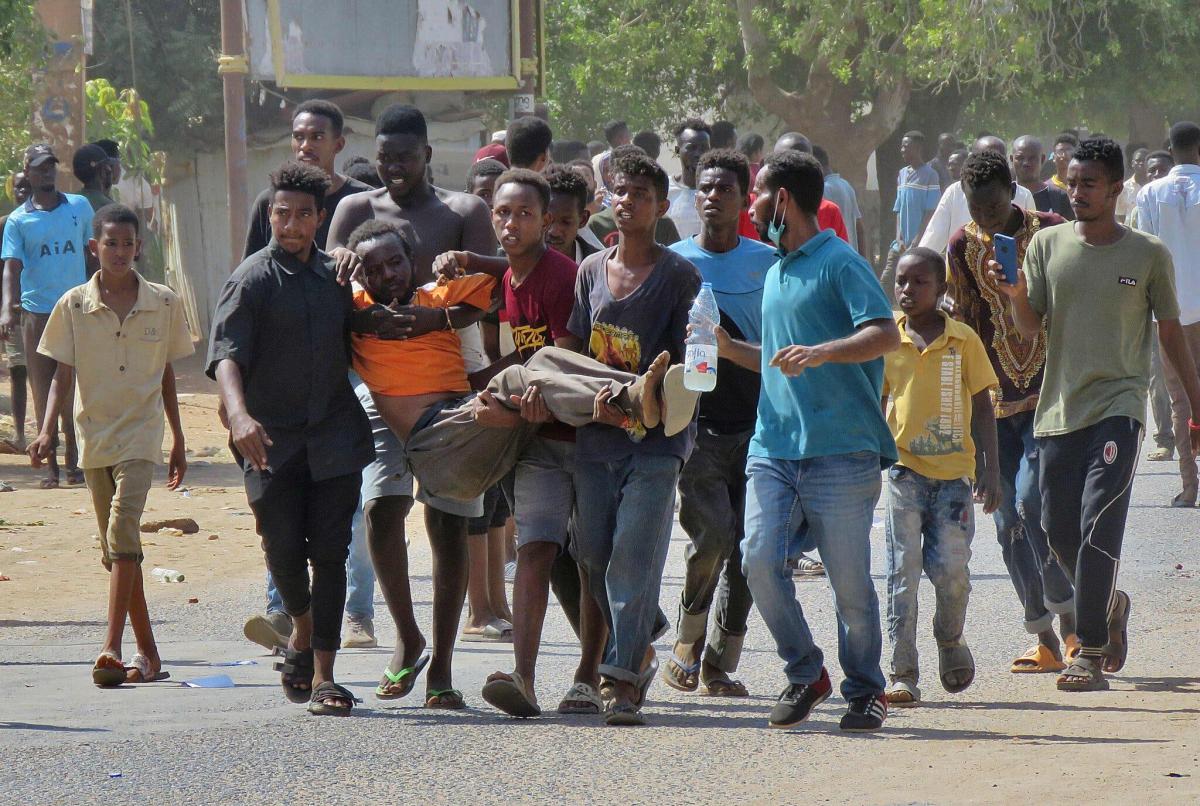
The vacuous formalism of bourgeois political science, aped on the left by the partisans of parliamentary cretinism, has rarely displayed its sheer futility as clearly as it has in Sudan in recent years.
In April 2019, the Sudanese revolution, after months of struggle and scores of martyrs murdered by the armed forces, brought to an end the three-decade rule of the hated dictator Omar al Bashir, who has been languishing in prison since then. This was what we called then the first victory of the Sudanese revolution. The entire Western establishment, on the other hand, decided that what had occurred was a “military coup in Sudan”, simply because under the pressure of the mass movement, which had since 6th April laid siege to the General Command of the armed forces, the heads of the four security forces had entered the residence of al Bashir on the 11th, arrested him and sent him to prison. It was a new collegial organ of the military that took over, the Transitional Military Council that monopolised the affairs of the country in its hand. But the revolutionary people continued their sit-in in front of the General Command demanding a real change of regime rather than just a token concession. In the end, after the fall of more than a hundred martyrs on 3rd June and a huge riposte on the part of the revolutionary masses on 30th June, the military proposed to form a joint military-civilian council called the Transitional Sovereign Council, which was supposed to lead the country to a democratic regime in the space of 39 months, with free elections due to be held in 2023. A government was formed, headed by a long-time servant of the so-called “international community”, a functionary of the United Nations, Abdalla Hamdok, a guarantor of the capitalist path Sudan would take despite the tempestuous revolution it was going through. So, the compromise of shared power was also a formula for tying the fate of the new regime to the dictates of imperialism.
Several days ago, on 25th October 2021, the military component of this Transitional Sovereign Council, led by the leader of the armed forces Abdel Fettah al Burhan, attacked wholesale this system of government, declaring a state of emergency, detaining the civilian members of the Council and Prime Minister Hamdok, expelling all provincial governors and promising to set up a new “technocratic” government. The same Western-led chorus once again characterised this move as a “military coup”.
Thus, an act that leads to the ouster of a 30-year dictator under the irresistible pressure of a revolution and another that leads to the ejection from government of some of the leaders of that same revolution are both called by the same name! How illuminating! A useful political science indeed! Actually, in both cases the usefulness of the designation “military coup” is that it hides from view what lies behind the smokescreen. Al Bashir’s ouster was simply an “orderly transition” through which the military that was ruling the country betrayed and sacrificed its leader so that it could save the regime from a more radical victory for the revolution. This was the formula United States imperialism had devised for the Arab revolutions back in 2011 and successfully implemented against Hosni Mobarak thanks to the Egyptian military. It was this model that was mimicked by the Sudanese military against al Bashir. To call this a military coup was a real feat since al Bashir himself had unilaterally dissolved the central government and dismissed all provincial governors only a month and a half ago, on 22nd February. Hence, the country was under military rule anyway! The entire episode of the ouster of al Bashir was, as a matter of fact, a political revolution in a roundabout manner.
On the other hand, the blow dealt to the Transitional Sovereign Council was, in a certain sense, a “military coup”, but the country already had a semi-military regime, with the position of head of state already in the hands of the Chief of Staff of the armed forces, al Burhan. The military possessed more than one half of state power. The reduction of what happened to a “military coup” hides from view the real substance of this act as well: this is a counter revolution that aims to quash the Sudanese revolution. It is true that the revolution was arrested in July 2019 with the setting up of this mixed Sovereign Council. However, this was only a “step towards the liquidation of the revolution” as we called it then. It was not the end of the revolution, which, to put it in terms of a metaphor, had been put into deep freeze by this very act. What the military expected was that once this kind of setup was in place, the revolutionary zeal of the popular masses would evaporate in the tedium of mundane discussions on legal niceties, the people would go back to their normal lives, and the military would thus win the upper hand. So, for them it was the first step in a process of liquidation of the revolution.
However, the time for the implementation of one of the terms of the agreement, i.e. the handing of the presidency of the Transitional Sovereign Council to a civilian nearing, and much more importantly, the insistence of the civilian wing on the absorption of the Rapid Support Forces led by that brutal murderer of the masses, General Mohamed Hamdan “Hemeti”, by the main body of the army led to a situation where the military could no longer tolerate the risks on its prerogatives, both political and economic. Hence it decided to move against the dormant forces of the revolution to eradicate what had remained of it.
The revolution raised its head like a sleeping lion awakened.
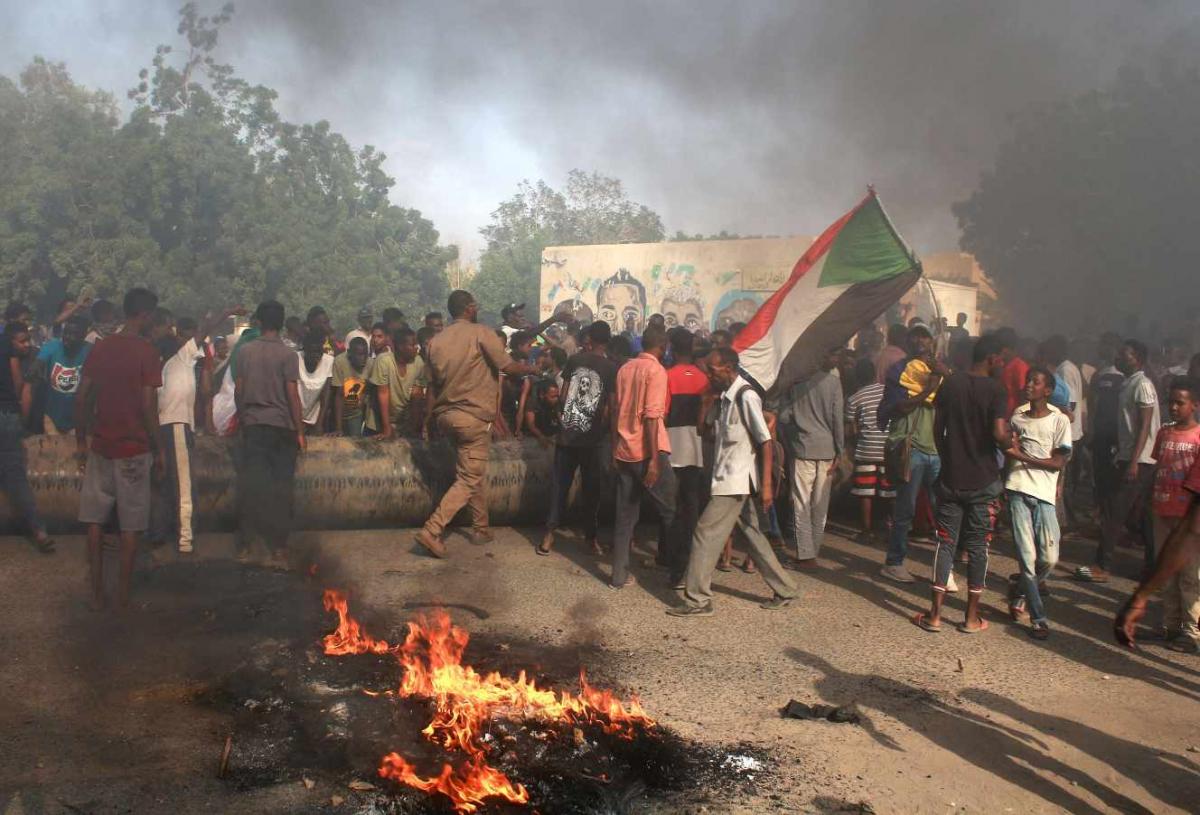
The inner contradictions of the revolution
This is what we wrote upon the setting up of the mixed military-civilian Transitional Military Council in July 2019.
“It should be obvious for anyone that whether the 11th member [of the said mixed Council] is a retired general, the head of the Sudan Bar Association or a Martian is immaterial. What is decisive is that the military will be part of the entire process of preparing the fundamentals of the future political regime. This is the self-same military that supported the murderous Omar al-Bashir for three decades, that was engaged in mass murder on a scale to be characterised by many as a genocide in Darfour, that fought a civil war with the South Sudanese in which the number of casualties is estimated to rise all the way to two million, and that grabbed its share of the riches of the country, first during the oil bonanza of the 2000s and now, once three fourths of the oil was lost to the new state of South Sudan that seceded in 2011, the new wealth promised by the discovery of gold in various regions of the country. There is no reason to think that the top brass will relinquish their hold on the levers of power by their own consent.”
We have been proved dead right! We were also right to say:
“Add to this the second important provision that the chair of the council will be from among the military wing for a full 21 months and one needs no special skills of prescience to conclude that the military are counting on the universal law of revolution that timing is of the essence of victory.”
These explain the dead-end to which the acceptance of the formation of such a council including the military and even granting them the presidency during the first two years has now led the forces of the revolution. However, we were wrong on one point:
“Their very realistic calculation is that once the Sovereign Council starts its business of developing the provisions of the future constitution, delving into intricate legal nuances, the mass of the people will be alienated from public affairs and will go back to the routine of everyday life, trying to pick up the pieces of the economy, which has come to a grinding halt in the long months of feverish revolutionary action, almost eight months from its beginning in late December 2018, with a two-month sit-in recently, when very few people engaged in regular work.”
Of course, we were right about the intentions of the military, but wrong in predicting the mood of the revolutionary people of Sudan. This is the surprise refutation that we have received from the Sudanese people. A very welcome refutation indeed. We have never been this happy to have found out that we were wrong!
So, the revolution has once again found the source of strength that it needs to extricate itself from the very difficult situation it has placed itself in. However, it is important now to determine which way the revolution should advance in order to survive and, subsequently, thrive.
Here we come to the crux of the matter. From the scant pieces of information that we can receive from Sudan, it appears that there are now two diverse lines defended by the forces of the revolution. On the one hand, there are those who wish to go back to the status quo ante. Let us quote from one of the most informed sources on the revolution with contacts inside Sudan:
“A number of entities affiliated with the Forces of Freedom and Change-Central Council, Resistance Committees, professional associations, and trade unions announced that the demonstrations aim for a number of demands, most notably adherence to the Constitutional Document, handing over the presidency of the Sovereignty Council to civilians, reforming the security sector, among other demands” (https://www.dabangasudan.org/en/all-news/article/sudan-military-seizes-power-arrests-pm-and-civilian-ministers-in-dawn-coup).
The programme defended is clear: The Sovereignty Council is to be maintained, but the presidency turned over to the civilian wing. To make clear that this wing is an extremely moderate one trying to make peace with the coup-mongers, let us add the following as well: “Sudan Doctors Central Committee… called for a commitment to peace and not responding to attempts to provocation” (ibid).
However, the balance of forces within the revolutionary masses seems to have changed for the better. The above wing enjoyed almost complete dominance during the earlier phases of the revolution. Now, we find out, a new wing is in the making.
Let us start out by noting that in the first eight months of the revolution, i.e. up until the Constitutional Document that set up the military-civilian mixed Sovereign Council was signed, it was the above moderate wing of the revolution, embodied in the quasi-official leadership called the Forces (earlier Alliance) of Freedom and Change, itself under the hegemony of the Sudanese Professional Associations, that controlled the political orientation of the revolutionary masses. Now it seems that a new centre is developing. Our sources are not exactly clear on the positioning of the different forces, but let us look at the symptoms of a new wing that is emerging.
Several days before the coup, on 21st October a “March of Millions for Civilian Governance” was organised against the atmosphere of coup-plotting that was already palpably felt in the country. This did bring out hundreds of thousands, if not millions, of people on the streets around the country. However, interestingly enough, this day of action was not organised under the leadership, as had become the custom, of the Forces for Freedom and Change. The leadership was named the “Joint Chamber of Marches of Millions for Civilian Governance”.
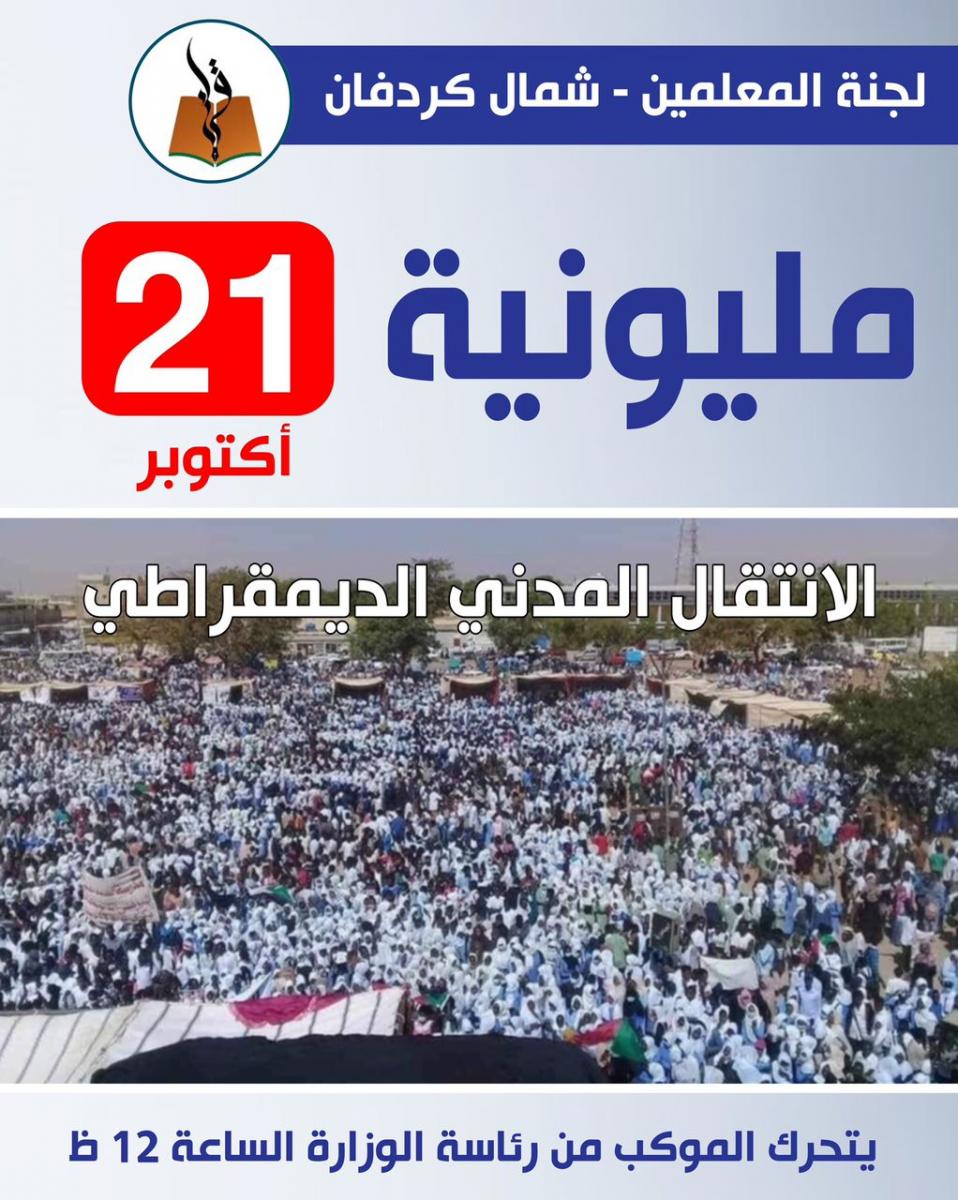
This is how our most reliable source describes the composition of this new formation:
“The Chamber, which includes 70 Resistance Committees and revolutionary, professional, and other bodies, demanded that the military hand over power [nota bene: not share it, but “hand over”], the formation of the Revolutionary Legislative Council and the completion of the peace process, in addition to handing over Al Bashir and his co-accused to the International Criminal Court” (https://www.dabangasudan.org/en/all-news/article/sudan-military-seizes-power-arrests-pm-and-civilian-ministers-in-dawn-coup).
(Let us note in passing that “the peace process” here does not imply “peace” with the military, but peace with the diverse armed rebel forces that fought the Sudanese army in such peripheral regions of the country as Darfour or Blue Nile State. As for the International Criminal Court, we will come back to that shortly.)
The Chamber’s programme is thus very different from the moderate wing. It demands that the military hand over power to civilians and that the country not be ruled according to the power-sharing scheme of the Constitutional Document but by a Revolutionary Parliament. This, as far as we can understand, is a variant of a constituent assembly orientation.
Further information suggests that there is a minority tendency even within this more radical wing that defends an all-out war on military power:
“Thirteen resistance committees in Khartoum however declared in a statement yesterday that the October 21 processions are ‘against all’ and not in support of the Forces for Freedom and Change. They explained in a joint statement that the processions are against what they described as a partnership of blood, and calls for its overthrow and the establishment of an undiminished national civil state” (https://www.dabangasudan.org/en/all-news/article/sudan-cities-brace-for-marches-of-the-millions-today, our emphasis).
We would finally draw the reader’s attention to the declaration made by one of the armed rebel forces:
“The Sudan People’s Liberation Movement-north under the leadership of Abdelaziz el Hilu (SPLM-El Hilu) called on the Sudanese to come out in the October 21 million to support the democratic transition and achieve demands, including civilian police and security [the word “civilian” here is a misnomer deriving from the difficulty of rendering the Arabic “madaniyya”, which implies both secular and non-military], building a single non-politicized professional national army, the return of displaced people and refugees to their areas of origin and retribution for the martyrs, as well as managing economic resources, especially gold, through civilian rule” (https://www.dabangasudan.org/en/all-news/article/sudan-cities-brace-for-marches-of-the-millions-today).
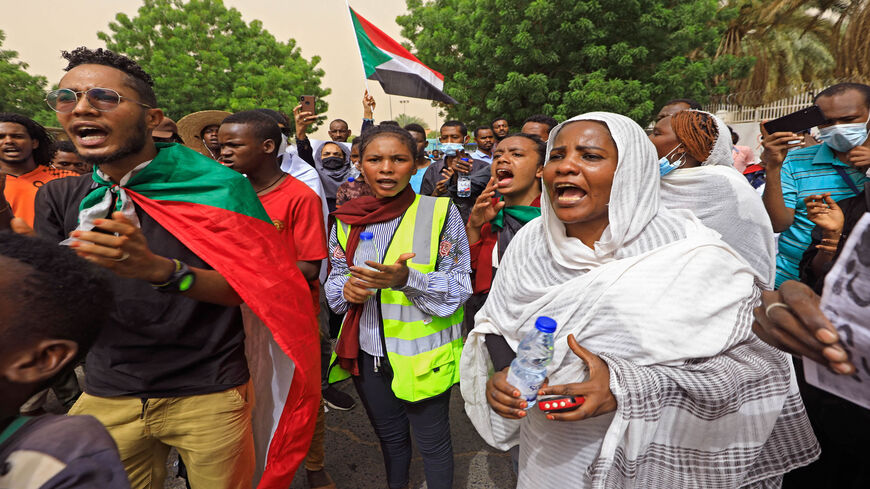
What is interesting here is that the organisation in question not only advocates the reorganising of the police and the army, with an attack on the Rapid Support Forces of Hemeti the butcher when using the phrase “single non-politicized army”, and not only rights for the victims of the civil wars suffered by the country and retribution for the martyrs, which the army is against, but also an attack on the economic prerogatives of the army, and in particular of Hemeti, including and “especially gold”. This goes to the heart of the matter.
The modern petty bourgeoisie versus the proletariat and the urban and rural poor
This differentiation within the ranks of the revolution is great news! This means that the “Resistance Committees” are now gaining their political independence from the Sudanese Professional Associations and the Forces for Freedom and Change. This is how we explained the class basis of this division back in July 2019:
“This new economic regime, fuelled further by the oil bonanza of the 2000s, created its own class structure. The modern petty-bourgeoisie and the upper echelons of the salaried classes, together with the intellectuals, the artists, and the youth, formed an entire strata of class forces who are no longer contented with the Islamist outlook of the al-Bashir regime. These strata look to Western imperialism and to bourgeois democracy as the ‘ideal’ to be reached. These class forces, in particular the youth among their ranks, are the ones who projected a ‘liberal’ middle-class image of the revolution to the rest of the world by their savvy use of smart phones and social media, but also set the tone for the entire revolutionary movement because they are the ones who demonstrate in the centre of Khartoum, the capital city of Sudan. This was the social basis of the SPA and the main reason why it was hegemonic in the clash of political forces.
“There was a very different dynamics going on in the peripheral neighbourhoods of Khartoum and in the other cities and states, such as Atbara, Port Soudan, Gedaref, and Gezirah, where the revolutionary movement was strong. In the central districts of Khartoum, the SPA was the unchallenged leadership. However, in peripheral neighbourhoods and in other cities, where the working class and the urban poor of recent peasant origin rub elbows, the situation was very different. The neighbourhoods threw up their own leadership. These people were educated, so to speak, in the uprising of September 2013, which was triggered by the rise in the price of gasoline. Some 200 people died in that uprising, with the death toll concentrated disproportionately in poor peripheral neighbourhoods.
“As in the rest of the Islamic world and, indeed, in backward countries in general, these neighbourhoods are dense webs of social affinity, where everyone has known each other from childhood and where political relations are built upon relations of everyday networks of friendship and solidarity. Here the influence of the SPA was distant and mediated. It was here again, as in 2013, that the clash between the revolutionary people and the ‘security forces’ took the fiercest forms and the casualties were highest. It was also here that ‘resistance committees’ as alternative leaderships to the SPA and the Alliance were formed. These rank and file bodies have been decisive in the struggle in many parts of Sudan and have not received the attention they deserve.
“This class difference is the basis of the compromising attitude of the SPA and the Forces for Freedom and Change hegemonised by the SPA. The relatively well-to-do, and we stress the word ‘relatively’, modern petty-bourgeoisie and the upper echelons of the proletariat, as opposed to the rank and file of the proletariat, the urban poor, and the poor peasantry, has a lot to lose if the revolution goes too far. And their patrons in the imperialist countries do not want revolution, but simply an “orderly transition” to a more streamlined bourgeois democracy adapted to the ‘international community’.”
Without entering into detail, let us stress the fact that the last aspect of “a more streamlined bourgeois democracy adapted to the ‘international community’” is also of utmost importance. The civilian wing of the now defunct Transitional Sovereign Council and Prime Minister Hamdok were entirely pro-imperialist. They saw the salvation of the Sudanese people in the protection to be given by the United States and the European Union to Sudan. That is why when al Burhan hurried to please his patrons, Saudi Arabia and the United Arab Emirates (UAE), by recognising Israel, thus donning revolutionary Sudan the dubitable honour of becoming the fourth Arab country, together with the UAE, Bahrain, and Morocco, that now has ties to the Zionist state, there may not have been too much grumbling in the civilian wing of the Council. There is no reason, however, to attribute this and other pro-imperialist policies that Sudan adopted in the last couple of years to the complicity of the entire revolutionary front with imperialism and Zionism.
All this explains also why the so-called “international community” is so vociferously criticising the takeover by the military wing of the Sovereign Council and actively defending Hamdok and the civilian elements in the power structure. Let no one identify the structures set up by the dirty compromise of July 2019 that established Transitional Sovereignty Council as per the Constitutional Document. That compromise was the deed of the pro-imperialist wing of the revolution, the modern well-to-do petty bourgeoisie that yearned for a Western-type democracy and nothing more. It is this compromise that imperialism s now trying to save from destruction, since the alternative may very well be a radical revolution that sweeps everything it finds on its way, becoming a permanent revolution that brings the proletariat and the downtrodden to power.
Finally, a word of caution about the demand for “handing over Al Bashir and his co-accused to the International Criminal Court”. Rather than implying a conscious choice of collaborating with an institution of the world imperialist system, this demand corresponds to the passionate desire of the revolutionary forces that are determined to have al Bashir judged and convicted for his many crimes. And not to be missed is the demand for “his co-accused” to be tried as well. This implicitly means bringing culprits such as al Burhan and Hamden (Hemiti) to justice as well. So, in the current balance of forces the important aspect of the demand is its radicality and its implications of bringing also the generals in power to justice. It is to be hoped, of course, that as the radical wing of the revolutionary front matures politically, the entire idea of al Bashir being tried by the ICC, an imperialist institution, will be dumped in favour of a trial before a people’s court set by the Sudanese revolution itself
All power to the Resistance Committees!
Revolutions are those moments in history when treading the middle ground is the most suicidal road. The experience of the Sudanese revolution has shown this much more clearly than many other revolutions. The Sudanese Professionals Association, which fought the forces of repression courageously until July 2019, suddenly yielded in front of the military and hoped that a moderate line would bring them and their revolution good. They found out, however, to their great chagrin, that there is no way to reconcile revolution and counter revolution. Fortunately, the revolution came into its own in bewildering speed. To squander this second chance by trying to rehash the road that has been tried and failed would be folly. The Sudanese revolution must go to the very end if it is not to suffer a catastrophic defeat the next time around. Only those who have nothing to lose will go to the end. Not the better-off petty-bourgeoisie represented by the Sudanese Professional Associations or the Forces for Freedom and Change, but the Resistance Committees that have sprung from the bosom of the poor working-class neighbourhoods and fight the police and the army no matter what happens. There is every reason, then, to call for all power to be vested in the Resistance Committees. Most importantly, a revolutionary party of the vanguard of the proletariat is a necessary element for that to happen. This is of course a formidable task to accomplish in the heat of a revolutionary confrontation, but there is no alternative nor any short-cuts.
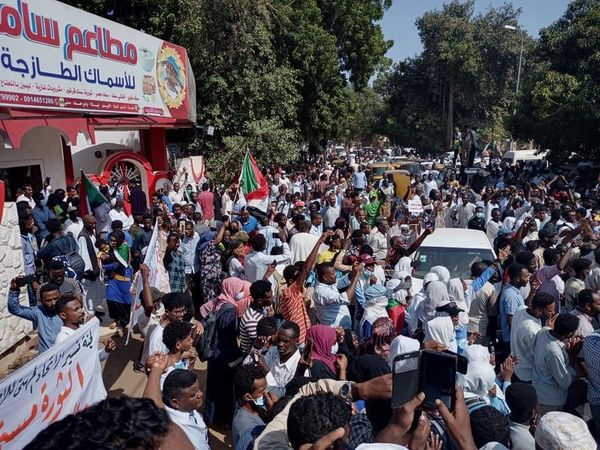
As for those of us who live and struggle in other countries, but above all the countries of MENA (the Middle East and North Africa), it is our indispensable duty to do our utmost to extend our solidarity to the Sudanese people, who in heroic initiative and courage overthrew an ill-famed butcher but are not giving up until they win a country where freedom and dignity reign.
